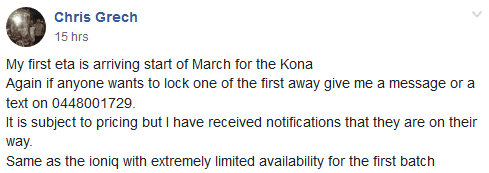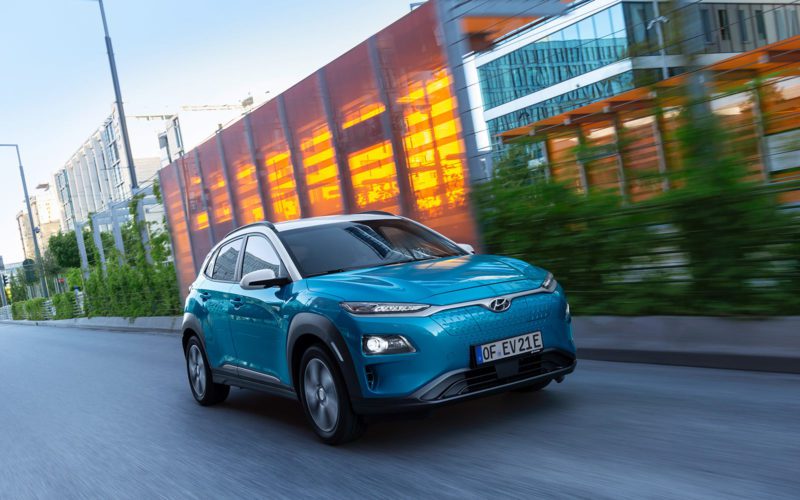Dealers for South Korean carmaker Hyundai say they will have the all-electric crossover, the Kona Electric, available from early March and at least one is already taking bookings for test drives.
The longer range Kona Electric with 64kWh battery and 400km real world range will be the next car with all-electric powertrain to hit Australian shores.
It follows the introduction of the Ioniq in late 2018, also made by Hyundai and the first such vehicle to be priced under $A50,000 in Australia.
An invitation for interested buyers to book a test drive in the highly anticipated EV was extended to a Facebook group of Hyundai electric car enthusiasts.
Car salesperson Chris Grech from the Victorian dealership Hyundai South Morang wrote, “My first eta is arriving start of March for the Kona. Again if anyone wants to lock one of the first away give me a message or a text on 0448001729.”
“It is subject to pricing but I have received notifications that they are on their way,” he writes.
While the Kona is expected to be priced at around $A53,000-55,000 – according to staff who spoke with The Driven at the Brisbane AEVA conference last year – it is likely to attract a huge amount of interest, given its positive reviews overseas.
However, it seems certain that there may be very limited numbers imported initially.
“Same as the ioniq with extremely limited availability for the first batch,” Grech writes.

This is pretty much the case for all battery electric cars that reach Australian shores, and is likely to remain the case unless government gets on board and sets reasonable policy and targets aimed at accelerating the uptake of zero emissions vehicles.
Without ambitious targets – and financial incentives – carmakers are simply going to keep on dragging their feet in presenting Australians with a decent range of electric car options, at a price they can afford.
State governments are starting to lead the way – NSW recently committed to 10% battery electric government fleets starting from 2020, while Queensland’s Qfleet will double its numbers of EVs each year and continue to turnover models to create a secondhand EV market.
But the federal government’s senate report on EVs released yesterday merely recommends that EV targets, policies and awareness should be considered – not one single quantifiable target was set down in writing, despite the efforts of the committee chair, independent Senator Tim Storer.
The Kona Electric is experiencing high demand and sales are on the increase globally, as has been confirmed in the South Korean carmaker’s own sales figures – export sales now represent 4x that of domestic sales.
But with buyers in countries like Norway reporting waits of up to a few years (Hyundai took 20,000 orders there before closing the books), it’s highly likely Australia’s Kona Electric import numbers will be, as Grech says, “extremely limited”.
Indeed, the Ioniq BEV has already sold out in Australia, according to a person familiar with the matter, with many buyers also reporting on social media that they will have to wait up to two months for their EV to be delivered.
While the Ioniq is available in hybrid, plug-in hybrid and all-electric powertrains, it has been by and large the latter (battery electric or BEV) that has resulted in the most sales.
The same source has said that another import batch of the Ioniq BEVs will arrive in April, although this is yet to be confirmed by Hyundai.

Bridie Schmidt is associate editor for The Driven, sister site of Renew Economy. She has been writing about electric vehicles since 2018, and has a keen interest in the role that zero-emissions transport has to play in sustainability. She has participated in podcasts such as Download This Show with Marc Fennell and Shirtloads of Science with Karl Kruszelnicki and is co-organiser of the Northern Rivers Electric Vehicle Forum. Bridie also owns a Tesla Model Y and has it available for hire on evee.com.au.

